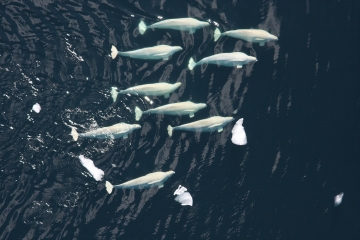Beluga_360 px width.jpg

A few species of toothed whales, such as the beluga whale (pictured), experience menopause. Credit: NOAA/NMFS/National Marine Mammal Laboratory
As women enter middle age, their bodies gradually stop menstruating until they hit menopause, when they can no longer bear children. But humans aren’t the only mammals to experience menopause. In fact, five species of toothed whales go through “the change” as well—and it seems to be related to longevity.
Short-finned pilot whales, false killer whales, orcas, narwhals and beluga whales are the only species in the world besides humans and one group of chimpanzees that undergo menopause. But scientists haven’t known why. So researchers from the University of Exeter in the U.K. assembled a database of lifespans and reproductive lifespans—the number of years the species can reproduce—for 32 species of toothed whales. Then the researchers compared the species with menopause to those without it.
They found that females of the five whale species that have menopause live longer than any other whale species of a similar size, even though their reproductive lifespans are similar. They even outlast their male counterparts. Female orcas, for instance, have double the lifespan of male orcas and can live well into their 80s. Most animals can reproduce for their entire lives, which maximizes the chances of survival for their species. So, if an animal lives many years beyond its ability to bear offspring, there should be an evolutionary reason that living so long benefits the species.
It appears that toothed whales live so long so they can fulfill an important social role: being grandmothers. After menopause, they’re no longer competing with their daughters for mates, but they often share food with other individuals and use their knowledge to help their group find food when it’s scarce, thereby boosting the species’ chances of survival.


